人教版(2019)必修 第一册Unit 3 Sports and fitness Discovering Useful Structures课件(共39张PPT)
文档属性
| 名称 | 人教版(2019)必修 第一册Unit 3 Sports and fitness Discovering Useful Structures课件(共39张PPT) | 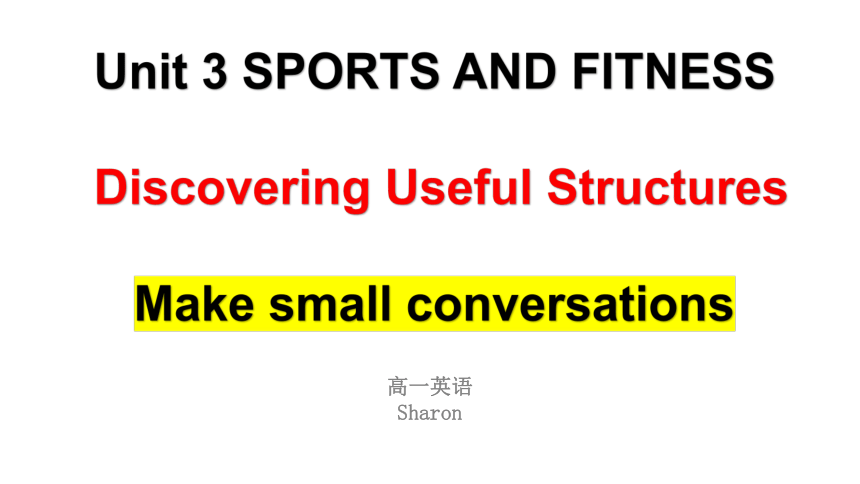 | |
| 格式 | pptx | ||
| 文件大小 | 549.0KB | ||
| 资源类型 | 教案 | ||
| 版本资源 | 人教版(2019) | ||
| 科目 | 英语 | ||
| 更新时间 | 2023-10-25 09:15:19 | ||
图片预览

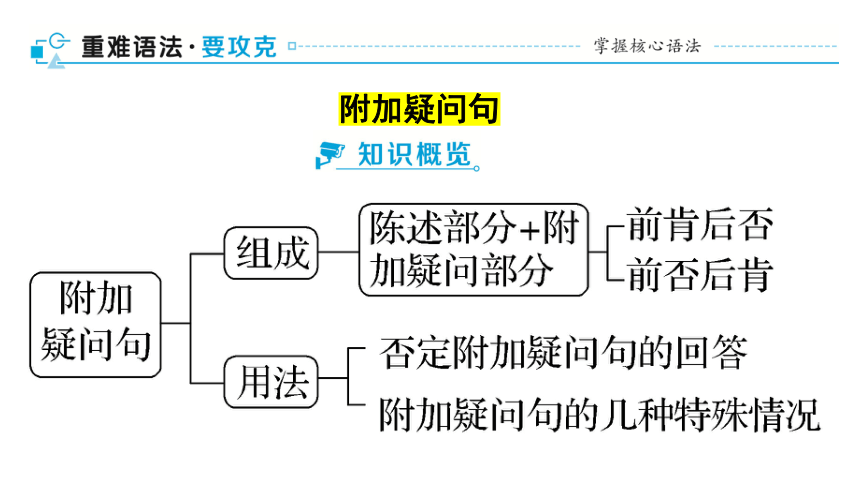
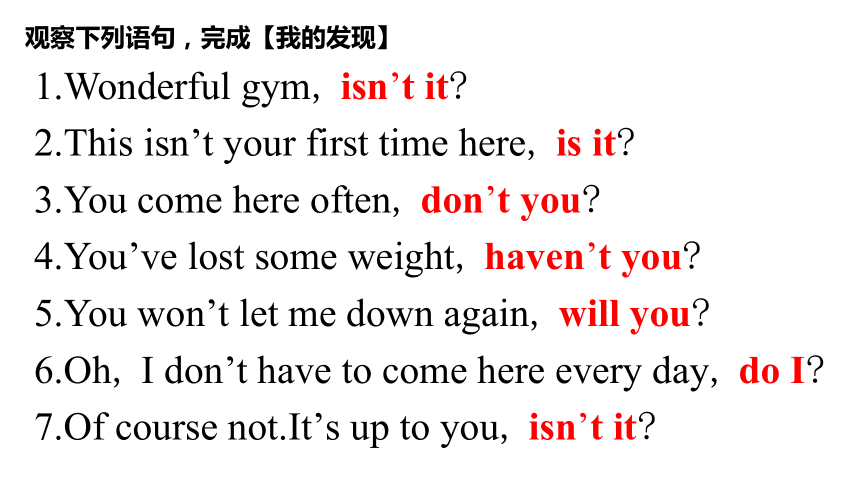
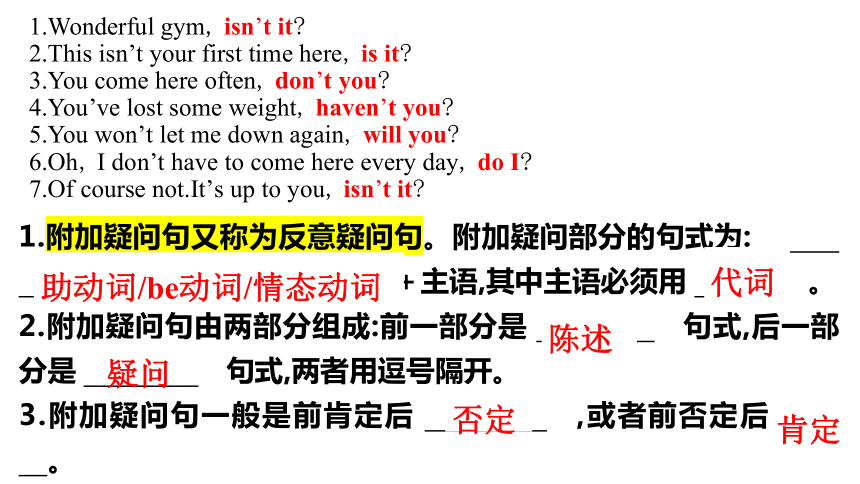
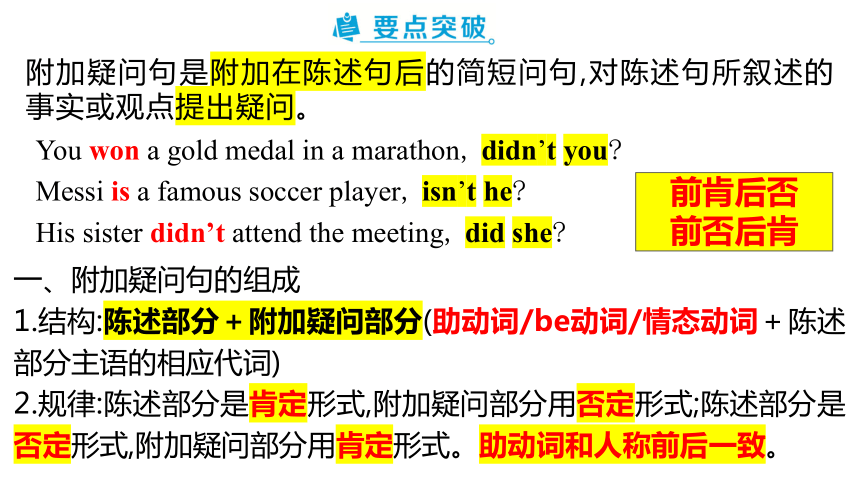
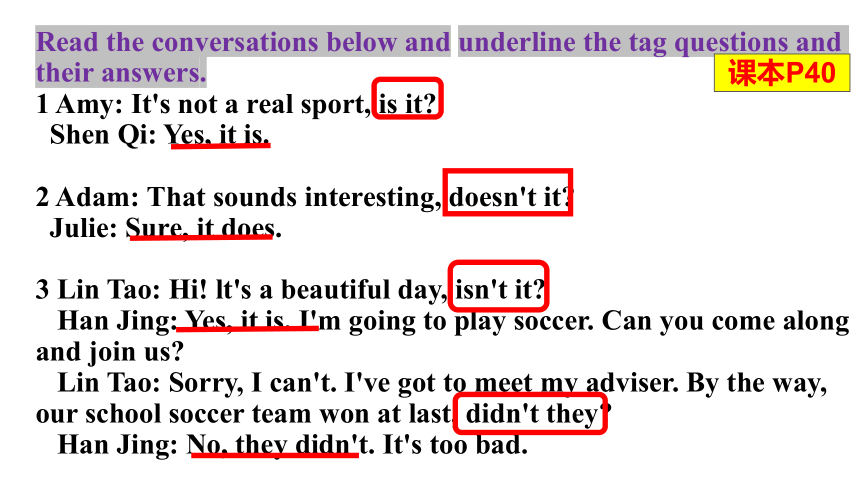
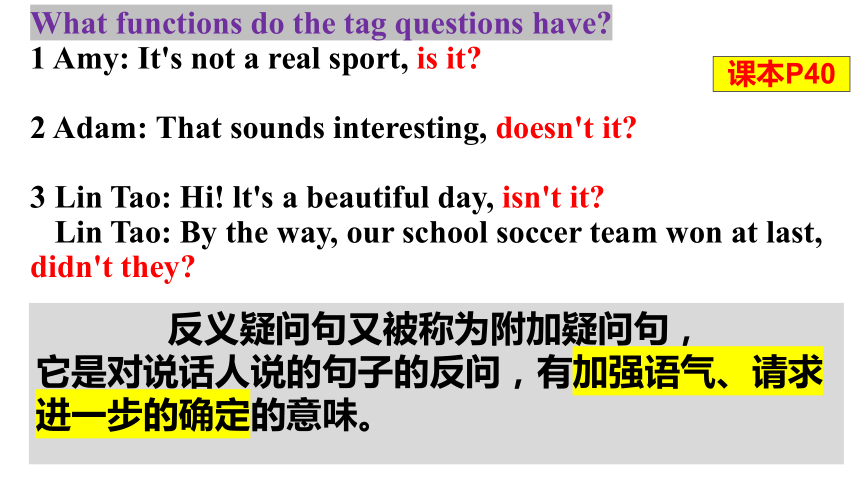
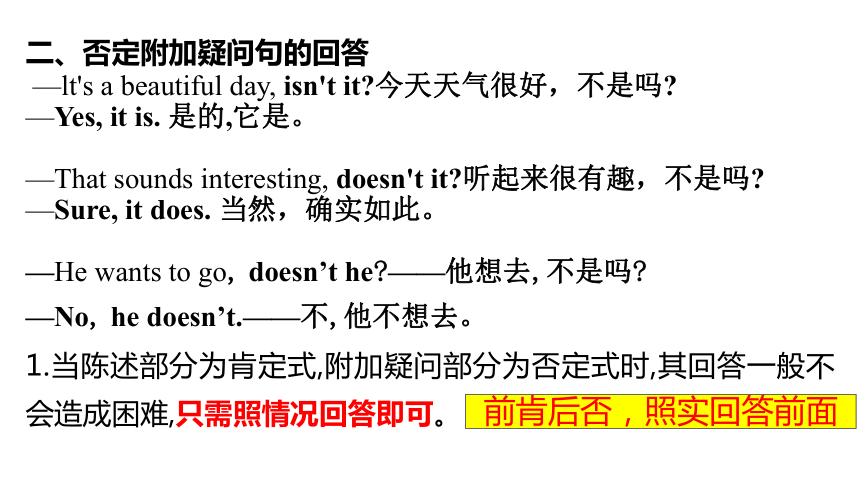
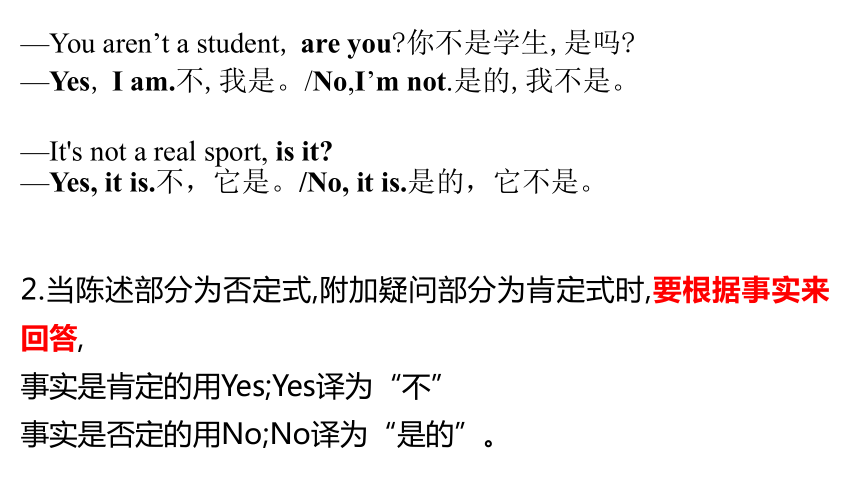
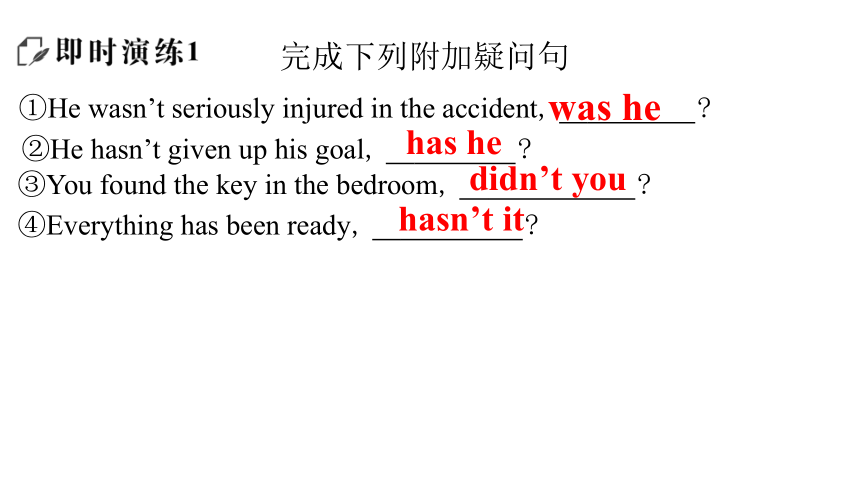
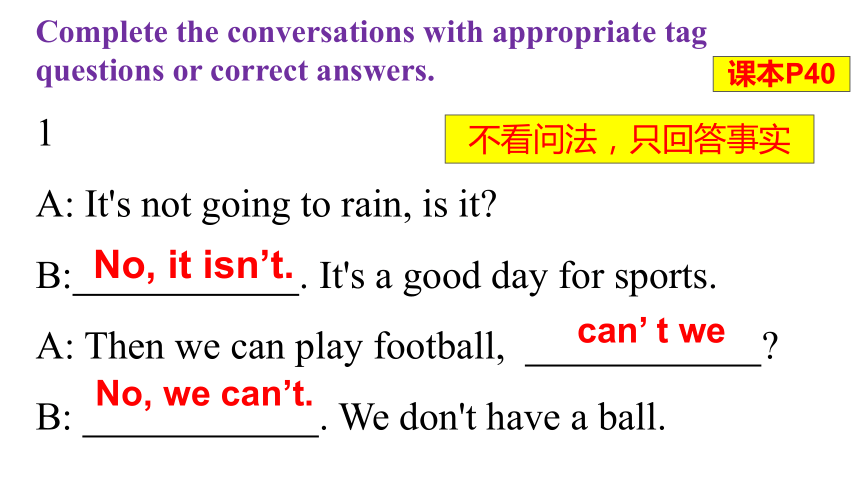
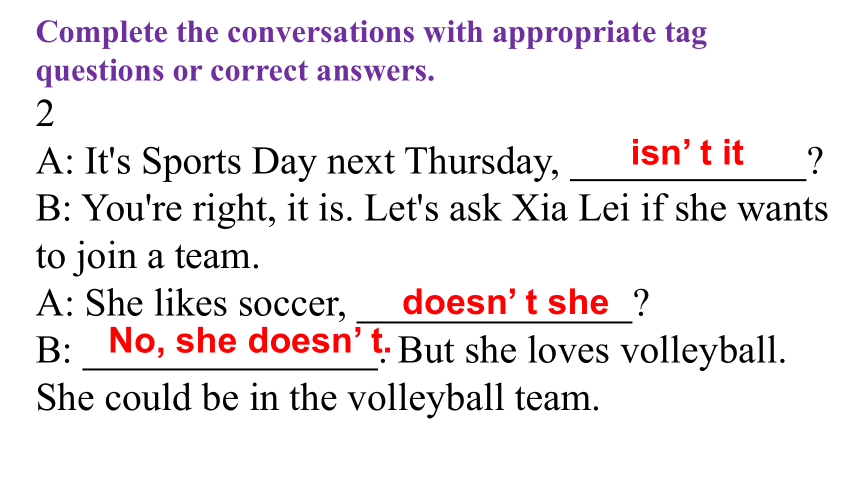
文档简介
(共39张PPT)
Unit 3 SPORTS AND FITNESS
Discovering Useful Structures
Make small conversations
高一英语
Sharon
附加疑问句
1.Wonderful gym, isn’t it
2.This isn’t your first time here, is it
3.You come here often, don’t you
4.You’ve lost some weight, haven’t you
5.You won’t let me down again, will you
6.Oh, I don’t have to come here every day, do I
7.Of course not.It’s up to you, isn’t it
观察下列语句,完成【我的发现】
1.Wonderful gym, isn’t it
2.This isn’t your first time here, is it
3.You come here often, don’t you
4.You’ve lost some weight, haven’t you
5.You won’t let me down again, will you
6.Oh, I don’t have to come here every day, do I
7.Of course not.It’s up to you, isn’t it
1.附加疑问句又称为反意疑问句。附加疑问部分的句式为: /be动词/情态动词 动词 +主语,其中主语必须用 代词 。
2.附加疑问句由两部分组成:前一部分是 陈述 句式,后一部分是 疑问 句式,两者用逗号隔开。
3.附加疑问句一般是前肯定后 否定 ,或者前否定后 肯定。
助动词/be动词/情态动词
代词
陈述
疑问
否定
肯定
附加疑问句是附加在陈述句后的简短问句,对陈述句所叙述的事实或观点提出疑问。
一、附加疑问句的组成
1.结构:陈述部分+附加疑问部分(助动词/be动词/情态动词+陈述部分主语的相应代词)
2.规律:陈述部分是肯定形式,附加疑问部分用否定形式;陈述部分是否定形式,附加疑问部分用肯定形式。助动词和人称前后一致。
You won a gold medal in a marathon, didn’t you
Messi is a famous soccer player, isn’t he
His sister didn’t attend the meeting, did she
前肯后否
前否后肯
Read the conversations below and underline the tag questions and their answers.
1 Amy: It's not a real sport, is it
Shen Qi: Yes, it is.
2 Adam: That sounds interesting, doesn't it
Julie: Sure, it does.
3 Lin Tao: Hi! lt's a beautiful day, isn't it
Han Jing: Yes, it is. I'm going to play soccer. Can you come along and join us
Lin Tao: Sorry, I can't. I've got to meet my adviser. By the way, our school soccer team won at last, didn't they
Han Jing: No, they didn't. It's too bad.
课本P40
What functions do the tag questions have
1 Amy: It's not a real sport, is it
2 Adam: That sounds interesting, doesn't it
3 Lin Tao: Hi! lt's a beautiful day, isn't it
Lin Tao: By the way, our school soccer team won at last, didn't they
课本P40
反义疑问句又被称为附加疑问句,
它是对说话人说的句子的反问,有加强语气、请求进一步的确定的意味。
二、否定附加疑问句的回答
—lt's a beautiful day, isn't it 今天天气很好,不是吗
—Yes, it is. 是的,它是。
—That sounds interesting, doesn't it 听起来很有趣,不是吗
—Sure, it does. 当然,确实如此。
—He wants to go, doesn’t he ——他想去,不是吗
—No, he doesn’t.——不,他不想去。
1.当陈述部分为肯定式,附加疑问部分为否定式时,其回答一般不会造成困难,只需照情况回答即可。
前肯后否,照实回答前面
—You aren’t a student, are you 你不是学生,是吗
—Yes, I am.不,我是。/No,I’m not.是的,我不是。
—It's not a real sport, is it
—Yes, it is.不,它是。/No, it is.是的,它不是。
2.当陈述部分为否定式,附加疑问部分为肯定式时,要根据事实来回答,
事实是肯定的用Yes;Yes译为“不”
事实是否定的用No;No译为“是的”。
完成下列附加疑问句
①He wasn’t seriously injured in the accident, was he
②He hasn’t given up his goal, has he
③You found the key in the bedroom, didn’t you
④Everything has been ready, hasn’t it
was he
has he
didn’t you
hasn’t it
Complete the conversations with appropriate tag questions or correct answers.
1
A: It's not going to rain, is it
B: . It's a good day for sports.
A: Then we can play football,
B: . We don't have a ball.
can’ t we
No, it isn’t.
No, we can’t.
课本P40
不看问法,只回答事实
Complete the conversations with appropriate tag questions or correct answers.
2
A: It's Sports Day next Thursday,
B: You're right, it is. Let's ask Xia Lei if she wants to join a team.
A: She likes soccer,
B: . But she loves volleyball. She could be in the volleyball team.
isn’ t it
doesn’ t she
No, she doesn’ t.
Complete the conversations with appropriate tag questions
or correct answers.
3
A: It's time for badminton class. Where is the coach
He's late,
B: It's been 10 minutes already. He isn't coming,
A: Cool! We can have a good time. That's great!
B: Shh!
A: Oh no, he's right behind me,
C: Yes, I am!
isn’ t he
is he
isn’t he
三、附加疑问句的几种特殊情况
there、不定代词与指示代词做主语
祈使句的反义疑问句:let’s 和let us
含否定的含义和否定的前缀
感叹句、并列句和主从复合句
特殊的情态动词
there、不定代词与指示代词做主语
There was an old stadium in front of our school, wasn’t there
There are some ducks swimming in the river, aren’t there
陈述句是存在句There be句型时,
简短问句为be的适当形式+ there
there、不定代词与指示代词做主语
Someone is waiting for you at the school gate, isn’t he
Nobody want to go with you, do they
Everyone likes apples, doesn’ t he
Nothing is better than this method, is it
表示人的不定代词(如everyone/everybody/someone/somebody/no one等)时,简短问句的主语:复数they或单数he。
表示物的不定代词(如nothing/everything/anything等)时,简短问句的主语用it代指。
there、不定代词与指示代词做主语
This isn’ t your first time here, is it?
That is a new car, isn’t it
These are credit cards, aren’t they
Those aren’t my friends, are they
指示代词this/that,简短问句的主语用it;
指示代词these/those,简短问句的主语用they。
祈使句的附加疑问句
Look at me please, will/won’ t you
Open the window, will/ won’t /would you
Don’ t eat in class, will you
肯定祈使,疑问用will/would/won’t you,
否定祈使,疑问用will/can you;
Let’ s play a game, shall we
Let’ s go hiking, shall we
Let us go to the park, will you
let’s 开头的用shall we,
let us/me开头的用will you.
will you表示请求
won’ t you表示邀请,劝说
祈使句的反义疑问句
3.当祈使句为Let's...时,反义疑问句要用 shall we。
当祈使句为 Let us...时,则要分两种情况:
即表示请求时,反意疑问句用will you,
表示建议时,反意疑问句用shall we。
例:
Let's take a bus,shall we 我们坐公交车好吗?
Let us know your phone number, will you
请把你的电话号码告诉我们,好吗?
Let us go swimming tomorrow, shall we
我们一起去游泳好吗?
含否定的含义和否定的前缀
He seldom contacts his family, does he
There is little milk in the fridge, is there
There's hardly any tea left,is there?
陈述部分有little、 few、 never、 hardly、 seldom、 no、 nothing、 nobody、 no one、 none、 neither等表示否定意义的词时,附加疑问部分用肯定形式。
含否定的含义和否定的前缀
Your son is unhappy, isn’t he
They disagree with our decisions, don’t they
It is impossible to learn English well in a month, isn’t it
陈述部分含有由un-, im-, in-, dis-等否定意义的前缀构成的词语时,陈述部分要视为肯定含义,附加疑问部分用否定形式。
感叹、并列、主从复杂句
1)What a fine day it is today!
What a fine day it is today,isn’ t it?
2)How fast he runs!
How fast he runs,doesn’ t he?
3)What a long time we have been waiting!
What a long time we have been waiting,haven’ t we?
感叹句的附加疑问部分需用be的一般现在时态的否定形式或助动词的其他形式。
感叹、并列、主从复杂句
She is always a good girl, and she is never late for school, is she
陈述句为并列句,附加问句与邻近分句保持一致;
The students are talking loudly when the teacher came in, aren’t they
He said the match was a failure, didn’t he
陈述句为主从复合句,附加问句与主句保持一致。
名师点津
I don’t think he cheated in the match, did he
我认为他在比赛中没有作弊,对吗
当陈述部分是
“I’m sure, I’m afraid, I think/suppose/expect/imagine/believe等+宾语从句”结构时,其附加疑问部分以从句为准,而且要注意陈述部分的否定转移现象。
特殊的情态动词must
We must finish our homework on time, mustn’t we
1)作为情态动词表“必须”,这时反意疑问句直接用mustn't/needn't
The baby must be sleeping now, isn’t he
2)表示推测时,由must后面的动词决定。
must have done... 表示对过去事实的肯定推测
“must have done”,表示对对过去事实的肯定推测
eg.
They must have gone there last night, didn't they
They must have arrived by now, haven't they
They must have been to the Great Wall, haven't they
They must have learnt 5000 English words by the end of last term, hadn't they
1. 有表示过去的时间状语,问句用过去时didn't;
2. 没有表示过去的时间状语,问句用现在完成时haven't或hasn't。
3. 陈述句中有表示过去完成时的时间状语,问句用hadn't.
特殊的情态动词
He used to smoke a lot, didn’t/usedn’t he
谓语为used to(曾经;过去经常),简短问句为didn’ t/
usedn’ t+主语
He had better find his wallet, hadn’t he
谓语为had better最好做时,简短问句用hadn’t+主语。
You ought to take care of them, oughtn’t/shouldn’t you
谓语为ought to(应该),简短问句用ought(n’t)/
should(n't)+主语。
特殊的情态动词
He has a lot of things to do today, doesn’t he
She has been to the city several times, hasn’t she
谓语为have/has“有”时,问句:do的适当形式+主语 ;
若have/has作助动词时,则用have/has的适当形式。
They needn’t hand in their homework today, need they
We need more information to make a decision, don’t we
need/dare作情态动词时,问句用need(n’t)/dare(n’t);
作实义动词“需要/敢”时,借助助动词do的适当形式。
特殊的动词
We have to arrive there on time, don’t we
She had to finish this task as soon as possible, didn’t she
谓语为have to不得不时,简短问句用do的适当形式。
完成下列附加疑问句
①Jack had dinner with his mother at home yesterday, didn’t he
②His parents must have been hard on him when he was young,
weren’t they
③Let’s go and have a rest, shall we
④Turn off the lights when you leave the classroom, will/won’t you
⑤I don’t think it is a good movie, is it
⑥You’d better recite some Tang Poems, hadn’t you
didn’t he
weren’t they
shall we
will/won’t you
is it
hadn’t you
课时检测·提能力
小黄本课时检测P184
维度一:基础题型练
完成下列附加疑问句。
1.Your parents had a long talk with you last night, didn’t they
2.Everyone has advised you not to go on a diet, haven’t they/hasn’t he
3.Shopping isn’t what you want to do, is it
4.Everything seems all right, doesn’t it
5.You must have got the letter yesterday, didn’t you
6.She seldom argues with others, does she
7.They are hopeless, aren’t they
didn’t they
haven’t they/hasn’t he
is it
doesn’t it
didn’t you
does she
aren’t they
8.Don’t play with fire, will you
9.Let’s go home, shall we
10.They told me it was not true, didn’t they
11.There is nobody outside, is there
12.—He knows little about it, does he
—Yes, he does ./No, he doesn’t .
will you
shall we
didn’t they
is there
does he
he does
he doesn’t
维度二:语法与写作
1.Let’s set an example to the junior students, shall we
让我们给低年级的学生树立一个榜样,好吗
2.Don’t lose heart even when in trouble, will you
即使处在困境中也不要丧失信心,好吗
3.Let us go to the playground together to play football, will you
让我们一起去操场踢足球,好吗
4.You must apply for a visa before going abroad, mustn’t you
在出国之前你必须申请签证,是不是
5.You must have left your bag in the theatre, haven’t you
你一定是把包落在剧场了,是不是
set an example to
shall we
lose heart
will you
go to the playground
will you
apply for a visa
mustn’t you
haven’t you
6.With great determination, he never loses heart , does he
有了巨大的决心,他从不灰心,是不是
7.He never told his parents that their friendship fell apart , did he
他从不告诉他的父母他们的友谊破裂了,对吗
8.Health is more important than wealth, isn’t it
健康比财富重要,是不是
9.Gymnastics can build up our strength and make us have a graceful figure, can’t it
体操训练能增强我们的力气,塑造我们优美的体形,是吗
10. Let’s go to the gym to do gymnastics, shall we
让我们去体育馆做体操训练,好吗
loses heart
does he
fell apart
did he
isn’t it
build up our strength
can’t it
Let’s go to the gym
shall we
维度三:语法与语篇
阅读下面对话,补全对话中的附加疑问部分或答语。
1.Lily:I haven’t seen you recently.What are you doing these days
Bob:I am doing research on how to protect wildlife.
Lily:You have never done such research before, (1) have you
Bob:Yes, this is the first time that I have done this.I have read some papers on this topic and also attended a lecture.
Lily:The lecture is very useful to your research, (2) isn’t it
Bob:Yes, it is.It is also inspiring.
Lily:It inspires you to find more information about the topic, doesn’t it
Bob:(3) Yes , it does .It has provided inspiration for me to explore in depth about the topic.
have you
isn’t it
Yes
it does
2.Sam:Amy, there will be a film in the school hall tonight, (1) won’t there
Amy:I’ve just heard about it.It is called A Brief History of Time, a film about Stephen Hawking.
Sam:It must be a great movie, (2) isn’t it
Amy:I think so.Let’s watch it together, (3) shall we
Sam:OK, we can meet in front of the school hall at about six, (4) can’t we
Amy:OK, see you then!
Sam:See you!
won’t there
isn’t it
shall we
can’t we
3.Mother:Mary, you haven’t finished your homework,
(1) have you
Mary:Yes, I have.I’m reading a book now.You need help,
(2) don’t you
Mother:There are no tomatoes at home.I’m busy now.
Can you help me buy some
Mary:No problem.My father will come back for lunch,
(3) won’t he
Mother:Yes, he will.We will have a big lunch today.
have you
don’t you
won’t he
谢谢大家的观看
Unit 3 SPORTS AND FITNESS
Discovering Useful Structures
Make small conversations
高一英语
Sharon
附加疑问句
1.Wonderful gym, isn’t it
2.This isn’t your first time here, is it
3.You come here often, don’t you
4.You’ve lost some weight, haven’t you
5.You won’t let me down again, will you
6.Oh, I don’t have to come here every day, do I
7.Of course not.It’s up to you, isn’t it
观察下列语句,完成【我的发现】
1.Wonderful gym, isn’t it
2.This isn’t your first time here, is it
3.You come here often, don’t you
4.You’ve lost some weight, haven’t you
5.You won’t let me down again, will you
6.Oh, I don’t have to come here every day, do I
7.Of course not.It’s up to you, isn’t it
1.附加疑问句又称为反意疑问句。附加疑问部分的句式为: /be动词/情态动词 动词 +主语,其中主语必须用 代词 。
2.附加疑问句由两部分组成:前一部分是 陈述 句式,后一部分是 疑问 句式,两者用逗号隔开。
3.附加疑问句一般是前肯定后 否定 ,或者前否定后 肯定。
助动词/be动词/情态动词
代词
陈述
疑问
否定
肯定
附加疑问句是附加在陈述句后的简短问句,对陈述句所叙述的事实或观点提出疑问。
一、附加疑问句的组成
1.结构:陈述部分+附加疑问部分(助动词/be动词/情态动词+陈述部分主语的相应代词)
2.规律:陈述部分是肯定形式,附加疑问部分用否定形式;陈述部分是否定形式,附加疑问部分用肯定形式。助动词和人称前后一致。
You won a gold medal in a marathon, didn’t you
Messi is a famous soccer player, isn’t he
His sister didn’t attend the meeting, did she
前肯后否
前否后肯
Read the conversations below and underline the tag questions and their answers.
1 Amy: It's not a real sport, is it
Shen Qi: Yes, it is.
2 Adam: That sounds interesting, doesn't it
Julie: Sure, it does.
3 Lin Tao: Hi! lt's a beautiful day, isn't it
Han Jing: Yes, it is. I'm going to play soccer. Can you come along and join us
Lin Tao: Sorry, I can't. I've got to meet my adviser. By the way, our school soccer team won at last, didn't they
Han Jing: No, they didn't. It's too bad.
课本P40
What functions do the tag questions have
1 Amy: It's not a real sport, is it
2 Adam: That sounds interesting, doesn't it
3 Lin Tao: Hi! lt's a beautiful day, isn't it
Lin Tao: By the way, our school soccer team won at last, didn't they
课本P40
反义疑问句又被称为附加疑问句,
它是对说话人说的句子的反问,有加强语气、请求进一步的确定的意味。
二、否定附加疑问句的回答
—lt's a beautiful day, isn't it 今天天气很好,不是吗
—Yes, it is. 是的,它是。
—That sounds interesting, doesn't it 听起来很有趣,不是吗
—Sure, it does. 当然,确实如此。
—He wants to go, doesn’t he ——他想去,不是吗
—No, he doesn’t.——不,他不想去。
1.当陈述部分为肯定式,附加疑问部分为否定式时,其回答一般不会造成困难,只需照情况回答即可。
前肯后否,照实回答前面
—You aren’t a student, are you 你不是学生,是吗
—Yes, I am.不,我是。/No,I’m not.是的,我不是。
—It's not a real sport, is it
—Yes, it is.不,它是。/No, it is.是的,它不是。
2.当陈述部分为否定式,附加疑问部分为肯定式时,要根据事实来回答,
事实是肯定的用Yes;Yes译为“不”
事实是否定的用No;No译为“是的”。
完成下列附加疑问句
①He wasn’t seriously injured in the accident, was he
②He hasn’t given up his goal, has he
③You found the key in the bedroom, didn’t you
④Everything has been ready, hasn’t it
was he
has he
didn’t you
hasn’t it
Complete the conversations with appropriate tag questions or correct answers.
1
A: It's not going to rain, is it
B: . It's a good day for sports.
A: Then we can play football,
B: . We don't have a ball.
can’ t we
No, it isn’t.
No, we can’t.
课本P40
不看问法,只回答事实
Complete the conversations with appropriate tag questions or correct answers.
2
A: It's Sports Day next Thursday,
B: You're right, it is. Let's ask Xia Lei if she wants to join a team.
A: She likes soccer,
B: . But she loves volleyball. She could be in the volleyball team.
isn’ t it
doesn’ t she
No, she doesn’ t.
Complete the conversations with appropriate tag questions
or correct answers.
3
A: It's time for badminton class. Where is the coach
He's late,
B: It's been 10 minutes already. He isn't coming,
A: Cool! We can have a good time. That's great!
B: Shh!
A: Oh no, he's right behind me,
C: Yes, I am!
isn’ t he
is he
isn’t he
三、附加疑问句的几种特殊情况
there、不定代词与指示代词做主语
祈使句的反义疑问句:let’s 和let us
含否定的含义和否定的前缀
感叹句、并列句和主从复合句
特殊的情态动词
there、不定代词与指示代词做主语
There was an old stadium in front of our school, wasn’t there
There are some ducks swimming in the river, aren’t there
陈述句是存在句There be句型时,
简短问句为be的适当形式+ there
there、不定代词与指示代词做主语
Someone is waiting for you at the school gate, isn’t he
Nobody want to go with you, do they
Everyone likes apples, doesn’ t he
Nothing is better than this method, is it
表示人的不定代词(如everyone/everybody/someone/somebody/no one等)时,简短问句的主语:复数they或单数he。
表示物的不定代词(如nothing/everything/anything等)时,简短问句的主语用it代指。
there、不定代词与指示代词做主语
This isn’ t your first time here, is it?
That is a new car, isn’t it
These are credit cards, aren’t they
Those aren’t my friends, are they
指示代词this/that,简短问句的主语用it;
指示代词these/those,简短问句的主语用they。
祈使句的附加疑问句
Look at me please, will/won’ t you
Open the window, will/ won’t /would you
Don’ t eat in class, will you
肯定祈使,疑问用will/would/won’t you,
否定祈使,疑问用will/can you;
Let’ s play a game, shall we
Let’ s go hiking, shall we
Let us go to the park, will you
let’s 开头的用shall we,
let us/me开头的用will you.
will you表示请求
won’ t you表示邀请,劝说
祈使句的反义疑问句
3.当祈使句为Let's...时,反义疑问句要用 shall we。
当祈使句为 Let us...时,则要分两种情况:
即表示请求时,反意疑问句用will you,
表示建议时,反意疑问句用shall we。
例:
Let's take a bus,shall we 我们坐公交车好吗?
Let us know your phone number, will you
请把你的电话号码告诉我们,好吗?
Let us go swimming tomorrow, shall we
我们一起去游泳好吗?
含否定的含义和否定的前缀
He seldom contacts his family, does he
There is little milk in the fridge, is there
There's hardly any tea left,is there?
陈述部分有little、 few、 never、 hardly、 seldom、 no、 nothing、 nobody、 no one、 none、 neither等表示否定意义的词时,附加疑问部分用肯定形式。
含否定的含义和否定的前缀
Your son is unhappy, isn’t he
They disagree with our decisions, don’t they
It is impossible to learn English well in a month, isn’t it
陈述部分含有由un-, im-, in-, dis-等否定意义的前缀构成的词语时,陈述部分要视为肯定含义,附加疑问部分用否定形式。
感叹、并列、主从复杂句
1)What a fine day it is today!
What a fine day it is today,isn’ t it?
2)How fast he runs!
How fast he runs,doesn’ t he?
3)What a long time we have been waiting!
What a long time we have been waiting,haven’ t we?
感叹句的附加疑问部分需用be的一般现在时态的否定形式或助动词的其他形式。
感叹、并列、主从复杂句
She is always a good girl, and she is never late for school, is she
陈述句为并列句,附加问句与邻近分句保持一致;
The students are talking loudly when the teacher came in, aren’t they
He said the match was a failure, didn’t he
陈述句为主从复合句,附加问句与主句保持一致。
名师点津
I don’t think he cheated in the match, did he
我认为他在比赛中没有作弊,对吗
当陈述部分是
“I’m sure, I’m afraid, I think/suppose/expect/imagine/believe等+宾语从句”结构时,其附加疑问部分以从句为准,而且要注意陈述部分的否定转移现象。
特殊的情态动词must
We must finish our homework on time, mustn’t we
1)作为情态动词表“必须”,这时反意疑问句直接用mustn't/needn't
The baby must be sleeping now, isn’t he
2)表示推测时,由must后面的动词决定。
must have done... 表示对过去事实的肯定推测
“must have done”,表示对对过去事实的肯定推测
eg.
They must have gone there last night, didn't they
They must have arrived by now, haven't they
They must have been to the Great Wall, haven't they
They must have learnt 5000 English words by the end of last term, hadn't they
1. 有表示过去的时间状语,问句用过去时didn't;
2. 没有表示过去的时间状语,问句用现在完成时haven't或hasn't。
3. 陈述句中有表示过去完成时的时间状语,问句用hadn't.
特殊的情态动词
He used to smoke a lot, didn’t/usedn’t he
谓语为used to(曾经;过去经常),简短问句为didn’ t/
usedn’ t+主语
He had better find his wallet, hadn’t he
谓语为had better最好做时,简短问句用hadn’t+主语。
You ought to take care of them, oughtn’t/shouldn’t you
谓语为ought to(应该),简短问句用ought(n’t)/
should(n't)+主语。
特殊的情态动词
He has a lot of things to do today, doesn’t he
She has been to the city several times, hasn’t she
谓语为have/has“有”时,问句:do的适当形式+主语 ;
若have/has作助动词时,则用have/has的适当形式。
They needn’t hand in their homework today, need they
We need more information to make a decision, don’t we
need/dare作情态动词时,问句用need(n’t)/dare(n’t);
作实义动词“需要/敢”时,借助助动词do的适当形式。
特殊的动词
We have to arrive there on time, don’t we
She had to finish this task as soon as possible, didn’t she
谓语为have to不得不时,简短问句用do的适当形式。
完成下列附加疑问句
①Jack had dinner with his mother at home yesterday, didn’t he
②His parents must have been hard on him when he was young,
weren’t they
③Let’s go and have a rest, shall we
④Turn off the lights when you leave the classroom, will/won’t you
⑤I don’t think it is a good movie, is it
⑥You’d better recite some Tang Poems, hadn’t you
didn’t he
weren’t they
shall we
will/won’t you
is it
hadn’t you
课时检测·提能力
小黄本课时检测P184
维度一:基础题型练
完成下列附加疑问句。
1.Your parents had a long talk with you last night, didn’t they
2.Everyone has advised you not to go on a diet, haven’t they/hasn’t he
3.Shopping isn’t what you want to do, is it
4.Everything seems all right, doesn’t it
5.You must have got the letter yesterday, didn’t you
6.She seldom argues with others, does she
7.They are hopeless, aren’t they
didn’t they
haven’t they/hasn’t he
is it
doesn’t it
didn’t you
does she
aren’t they
8.Don’t play with fire, will you
9.Let’s go home, shall we
10.They told me it was not true, didn’t they
11.There is nobody outside, is there
12.—He knows little about it, does he
—Yes, he does ./No, he doesn’t .
will you
shall we
didn’t they
is there
does he
he does
he doesn’t
维度二:语法与写作
1.Let’s set an example to the junior students, shall we
让我们给低年级的学生树立一个榜样,好吗
2.Don’t lose heart even when in trouble, will you
即使处在困境中也不要丧失信心,好吗
3.Let us go to the playground together to play football, will you
让我们一起去操场踢足球,好吗
4.You must apply for a visa before going abroad, mustn’t you
在出国之前你必须申请签证,是不是
5.You must have left your bag in the theatre, haven’t you
你一定是把包落在剧场了,是不是
set an example to
shall we
lose heart
will you
go to the playground
will you
apply for a visa
mustn’t you
haven’t you
6.With great determination, he never loses heart , does he
有了巨大的决心,他从不灰心,是不是
7.He never told his parents that their friendship fell apart , did he
他从不告诉他的父母他们的友谊破裂了,对吗
8.Health is more important than wealth, isn’t it
健康比财富重要,是不是
9.Gymnastics can build up our strength and make us have a graceful figure, can’t it
体操训练能增强我们的力气,塑造我们优美的体形,是吗
10. Let’s go to the gym to do gymnastics, shall we
让我们去体育馆做体操训练,好吗
loses heart
does he
fell apart
did he
isn’t it
build up our strength
can’t it
Let’s go to the gym
shall we
维度三:语法与语篇
阅读下面对话,补全对话中的附加疑问部分或答语。
1.Lily:I haven’t seen you recently.What are you doing these days
Bob:I am doing research on how to protect wildlife.
Lily:You have never done such research before, (1) have you
Bob:Yes, this is the first time that I have done this.I have read some papers on this topic and also attended a lecture.
Lily:The lecture is very useful to your research, (2) isn’t it
Bob:Yes, it is.It is also inspiring.
Lily:It inspires you to find more information about the topic, doesn’t it
Bob:(3) Yes , it does .It has provided inspiration for me to explore in depth about the topic.
have you
isn’t it
Yes
it does
2.Sam:Amy, there will be a film in the school hall tonight, (1) won’t there
Amy:I’ve just heard about it.It is called A Brief History of Time, a film about Stephen Hawking.
Sam:It must be a great movie, (2) isn’t it
Amy:I think so.Let’s watch it together, (3) shall we
Sam:OK, we can meet in front of the school hall at about six, (4) can’t we
Amy:OK, see you then!
Sam:See you!
won’t there
isn’t it
shall we
can’t we
3.Mother:Mary, you haven’t finished your homework,
(1) have you
Mary:Yes, I have.I’m reading a book now.You need help,
(2) don’t you
Mother:There are no tomatoes at home.I’m busy now.
Can you help me buy some
Mary:No problem.My father will come back for lunch,
(3) won’t he
Mother:Yes, he will.We will have a big lunch today.
have you
don’t you
won’t he
谢谢大家的观看
